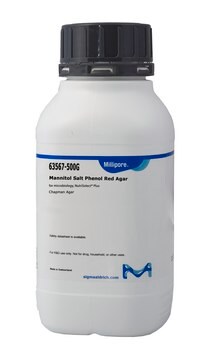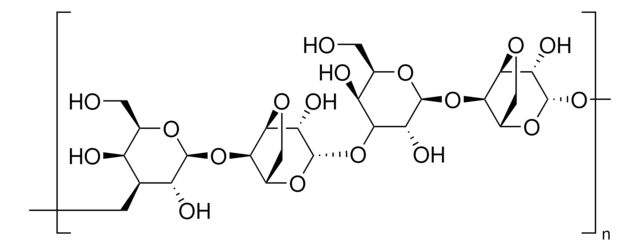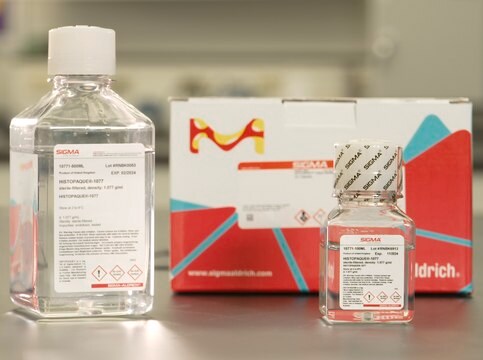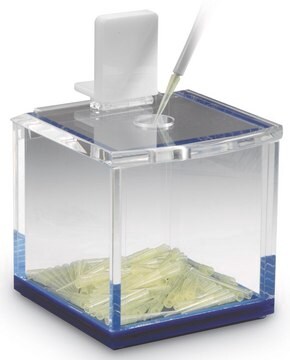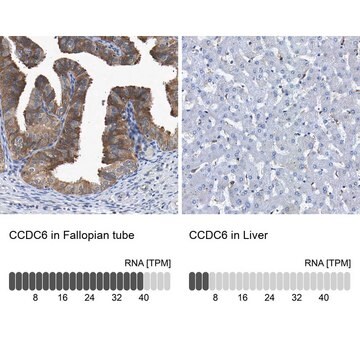69704
S-Protein-Agarose
Synonym(e):
S-protein resin
Anmeldenzur Ansicht organisationsspezifischer und vertraglich vereinbarter Preise
Alle Fotos(1)
About This Item
UNSPSC-Code:
41106500
NACRES:
NA.56
Empfohlene Produkte
Form
liquid
Qualitätsniveau
Hersteller/Markenname
Novagen®
Lagerbedingungen
do not freeze
Versandbedingung
wet ice
Lagertemp.
2-8°C
Allgemeine Beschreibung
S-Protein-Agarose hält S•Tag-Fusionsproteine zurück. Die Bindung kann im Säulen- oder Chargenmodus erfolgen. Die Elution wird durch die Verwendung von leicht denaturierenden Bedingungen oder einer spezifischen Protease wie Thrombin oder Enterokinase mit geeigneten rekombinanten Proteinen möglich. Die Kapazität von S-Protein-Agarose variiert und basiert auf der Größe und den Falteigenschaften eines bestimmten Zielproteins.
Sie besteht aus einer 15-fachen Aminosäuresequenz: Lys-Glu-Thr-Ala-Ala-Ala-Lys-Phe-Glu-Arg-Gln-His-Met-Asp-Ser (KETAAAKFERQHMDS).
Anwendung
S-Protein-Agarose wird zur Aufreinigung von rekombinanten S-Tag-Fusionsproteinen eingesetzt.
Warnhinweis
Toxizität: Standard-Handhabung (A)
Rechtliche Hinweise
NOVAGEN is a registered trademark of Merck KGaA, Darmstadt, Germany
Lagerklassenschlüssel
12 - Non Combustible Liquids
WGK
WGK 2
Flammpunkt (°F)
Not applicable
Flammpunkt (°C)
Not applicable
Analysenzertifikate (COA)
Suchen Sie nach Analysenzertifikate (COA), indem Sie die Lot-/Chargennummer des Produkts eingeben. Lot- und Chargennummern sind auf dem Produktetikett hinter den Wörtern ‘Lot’ oder ‘Batch’ (Lot oder Charge) zu finden.
Besitzen Sie dieses Produkt bereits?
In der Dokumentenbibliothek finden Sie die Dokumentation zu den Produkten, die Sie kürzlich erworben haben.
Kunden haben sich ebenfalls angesehen
Toshiki Takahashi et al.
EMBO reports, 20(4) (2019-02-26)
Rab family small GTPases are master regulators of distinct steps of intracellular vesicle trafficking in eukaryotic cells. GDP-bound cytoplasmic forms of Rab proteins are prone to aggregation due to the exposure of hydrophobic groups but the machinery that determines the
Jenelle A Patterson et al.
Frontiers in plant science, 9, 1338-1338 (2018-10-05)
Starch synthase 2 (SS2) is an important enzyme in leaf starch synthesis, elongating intermediate-length glucan chains. Loss of SS2 results in a distorted starch granule phenotype and altered physiochemical properties, highlighting its importance in starch biosynthesis, however, the post-translational regulation
Poornima Ramkumar et al.
The Journal of biological chemistry, 290(49), 29617-29628 (2015-10-16)
JLP (JNK-associated leucine zipper protein) is a scaffolding protein that interacts with various signaling proteins associated with coordinated regulation of cellular process such as endocytosis, motility, neurite outgrowth, cell proliferation, and apoptosis. Here we identified PLK1 (Polo-like kinase 1) as
Ivette M Sosa Seda et al.
Hepatology research : the official journal of the Japan Society of Hepatology, 40(7), 701-710 (2010-06-19)
Induction of hepatic stellate cell (HSC) apoptosis is a viable therapeutic strategy to reduce liver fibrogenesis. Although BH3-only proteins of the Bcl-2 family trigger pro-apoptotic pathways, the BH3-only proteins mediating HSC apoptosis have not been well defined. Our aim, using
Jean-André Lapart et al.
eLife, 8 (2019-12-11)
Cilia and flagella are conserved eukaryotic organelles essential for cellular signaling and motility. Cilia dysfunctions cause life-threatening ciliopathies, many of which are due to defects in the transition zone (TZ), a complex structure of the ciliary base. Therefore, understanding TZ
Unser Team von Wissenschaftlern verfügt über Erfahrung in allen Forschungsbereichen einschließlich Life Science, Materialwissenschaften, chemischer Synthese, Chromatographie, Analytik und vielen mehr..
Setzen Sie sich mit dem technischen Dienst in Verbindung.